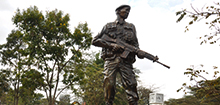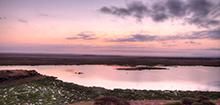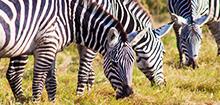Date Published:
The Ministry of Tourism and Wildlife, Kenya Wildlife Service and The Nature Conservancy collaborated in hosting representatives of Kenya’s Community Wildlife Conservation Committees (CWCC) for a two-day workshop at The Bomas of Kenya, 30th to 31st January, 2024.
Cabinet Secretary in the Ministry of Tourism and Wildlife Dr. Alfred Mutua, thanked the representatives for their dedication to ensuring peaceful coexistence between humans and wildlife. He explained that wildlife are part and parcel of human existence, exemplified by how often they featured in traditional oral literature.
Dr. Mutua regretted that the CWCC members last met in 2014, adding that H.E. President William Ruto’s government’s bottom up economic transformation agenda model would ensure that the common man’s grievances were addressed. The CS lauded the PS and DG for their collaborative conservation.
Dr. Mutua said that human population explosion is a major cause of human wildlife conflict, because of the deforestation and land use change that accompanies population growth. He thanked the people who volunteered their land up for the conservation of wildlife and their migratory corridors. The CS assured CWCC that the government would continue to compensate genuine claims arising from human wildlife conflict, pledging 1.2 billion shillings to the cause.
Dr. Mutua said that there was now a scheme administrator in place to streamline the entire compensation process. The administrator will work closely with the CWCC. This would ensure that victims of human wildlife conflict are able to easily report and track claims, which will enhance efficiency in the compensation process. He added that the government had provided 300 million shillings for electric fencing projects countrywide.
Dr. Mutua said that similar forums would be held more frequently, resulting in an informed populace, aware of the government’s and KWS’s efforts in reducing and mitigating human wildlife conflict. He told attendees that there is a Bill tabled in Parliament – The Conservation Management Bill, 2024 – which incorporates the evolving conservation scene and will eventually replace the current Wildlife Conservation and Management Act (WCMA), 2013. The PS pledged to revamp Kenya’s tourism industry and encouraged Kenyans to tour their unique country.
Principal Secretary, State Department for Wildlife Silvia Museiya thanked the representatives for attending the workshop and KWS. She advised the Senior Assistant Directors from all the conservation areas to work closely with the team. The PS said that she and KWS DG took over their respective roles in December 2022, and, since that time, had successfully managed to pay claims dating back to 2013. “During the last financial year, we made the first initial payment of 908 Million shillings,” PS added.
KWS DG Dr. Erustus Kanga said that the formal induction of the representatives during the two-day workshop was an extremely momentous occasion for KWS. He lamented their absence over the last three years, which resulted in a backlog of more than 15 – 20 thousand claims lying unattended to in field offices. Dr. Kanga explained that CWCCs are a creation of the law, and KWS was unable to progress – even as Secretariat during that period. DG thanked the CS and PS for facilitating the backlog to be processed, promising that claims forwarded would be handled expeditiously through the offices of the PS and the CS.
He stated that the team of representatives is intended to assist KWS to bring together relevant stakeholders to prepare management programs for wildlife in their various counties, geared towards mitigation and assisting KWS to decrease HWC incidents. He encouraged the team to embrace the challenge, further urging them to embrace integrity and transparency, noting that it was regrettable that a large number of past claims were fraudulent. However, Dr. Kanga expressed faith in the team, saying that future claims forwarded to the CS for action would be bankable and genuine.
Munira Bashir, Kenya Program Director for The Nature Conservancy, appreciated the representatives for their attendance and thanked them for their service to their country. “We are supporting this process and will continue to do so, because Human Wildlife Conflict is our biggest challenge in this country,” she said, pledging continued support to the representatives.
The workshop featured presentations by the State Department of Wildlife about the Wildlife Act 2013 and the Miscellaneous Amendment of 2019. KWS also made presentations about the history of, and challenges facing conservation in Kenya, in addition to walking participants through the compensation claims process in its entirety.
There was also a presentation by a consortium engaged to digitize the compensation process going forward. The consortium introduced numbers which the public affected by human wildlife conflict could be assisted: *202*09# and a toll-free number 0800 724 195. The compensation process will involve Community Verification Officers, whose task is to collect all information and evidence required for and claims to be verified and approved, after which claim settlements will be done after approval by authorized parties.
The representatives comprised four individuals from each of Kenya’s 47 counties, totalling 188, of which 172 attended the workshop. They were accompanied by KWS Senior Assistant Directors from all eight conservation areas (Western, Eastern, Central Rift, Southern, Northern, Tsavo, Mountain and Coast).
Some of the concerns raised by the representatives included how compensation claims for more than one remote area would be handled by a CWCC, given the time it sometimes takes for those afflicted by wildlife-related incidents to report the incidents.





